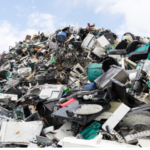
Understanding the Challenges: Issues in Current E-Waste Management

In our rapidly evolving digital world, the proliferation of electronic devices has led to a corresponding increase in electronic waste (e-waste). While the importance of responsible e-waste management is widely recognized, the current landscape presents a myriad of challenges that hinder effective disposal and recycling efforts. In this article, we’ll delve into some of the key issues plaguing the current e-waste management system and explore potential solutions to address these challenges.
- Lack of Awareness: One of the primary challenges in e-waste management is the lack of awareness among consumers and businesses regarding the environmental and health risks associated with improper disposal of electronic devices. Many individuals are unaware of the importance of recycling their old electronics or may not know how to do so properly. Solution: Education and outreach initiatives are essential for raising awareness about the impact of e-waste and promoting responsible disposal practices. Public awareness campaigns, educational workshops, and outreach programs can help inform individuals and businesses about the importance of recycling their electronic devices and the proper methods for doing so.
- Limited Infrastructure: In many regions, there is a lack of adequate infrastructure for e-waste collection, recycling, and disposal. This can result in electronic devices being improperly disposed of in landfills or incinerated, leading to environmental pollution and health hazards. Solution: Investment in e-waste recycling infrastructure is crucial for improving collection and recycling rates. Governments, businesses, and non-profit organizations can collaborate to develop and expand recycling facilities, collection programs, and e-waste management systems to ensure proper disposal of electronic devices.
- Complexity of Recycling: Electronic devices are composed of a wide range of materials, including metals, plastics, and hazardous substances. The complexity of these materials can make recycling challenging and costly, particularly for older or obsolete devices. Solution: Innovations in recycling technologies and processes are needed to improve the efficiency and effectiveness of e-waste recycling. Research and development efforts focused on developing advanced recycling methods, such as material recovery techniques and automated sorting systems, can help streamline the recycling process and increase resource recovery rates.
- Global Supply Chain Issues: E-waste is often exported to developing countries for processing and recycling, where it may be handled unsafely and contribute to environmental pollution and health risks. Additionally, the global nature of the electronics supply chain complicates efforts to regulate and track the flow of e-waste. Solution: International collaboration and regulatory frameworks are necessary to address the global e-waste problem effectively. Governments, industry stakeholders, and non-governmental organizations can work together to establish and enforce regulations governing the export and import of e-waste, as well as promote responsible recycling practices throughout the supply chain.
- Data Security Concerns: Disposing of electronic devices can pose data security risks, as sensitive information stored on these devices may be accessible if not properly erased or destroyed. This can be particularly concerning for businesses and organizations handling confidential or proprietary data. Solution: Implementing robust data sanitization and destruction measures is essential for protecting sensitive information during the disposal process. Secure data wiping techniques, encryption, and physical destruction methods can help ensure that data stored on electronic devices is permanently erased before recycling or disposal.
In conclusion, while e-waste management presents significant challenges, there are opportunities for improvement through education, infrastructure development, technological innovation, and regulatory action. By addressing these issues proactively and collaboratively, we can work towards a more sustainable and responsible approach to managing electronic waste, protecting the environment, and safeguarding public health.





